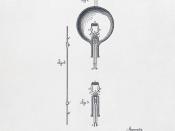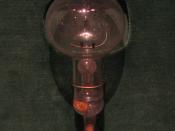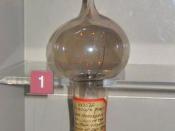In the early 1800s, coal and steam drove the machines of industry. By the late 1800s, new kinds of energy were coming into use. One was gasoline, which powered a new type of engine called an internal combustion engine. Small, light, and efficient, this engine would eventually make electricity. In the 1870s, the electric generator was developed, which produced a current that could power machines. This invention made it possible to bring the magic of electricity into daily life.
If electricity seemed like magic to people in the 19th century, Thomas Edison was perhaps the century's greatest magician. Over his career, Edison patented more than 1000 inventions, including the light bulb and the phonograph. Edison and his team invented the first practical electric light bulb in 1879. Within a few, Edison had perfected a longer lasting bulb and had begun installing electric lighting in New York City.
Other inventors helped harness electricity to transmit sounds over great distances.
Alexander Graham Bell was a teacher of deaf students who invented the telephone in his spare time. He displayed his device at the Philadelphia Exposition of 1876. The emperor of Brazil used it to speak to his aide in another room. When he heard the reply he exclaimed, "My word! It speaks Portuguese!" The telephone quickly became an essential of modern life. By 1900, there were nearly 2 million telephones in the United States.
The Italian inventor Guglielmo Marconi used theoretical discoveries about electromagnetic waves to create the first radio in 1895. This device was important because it sent messages using Morse Code through the air, without the use of wires. Primitive radios soon become standard equipment for ships at sea. Not until later could radios transmit human voices.
In the 1880s, German inventors used a gasoline engine to power a...


